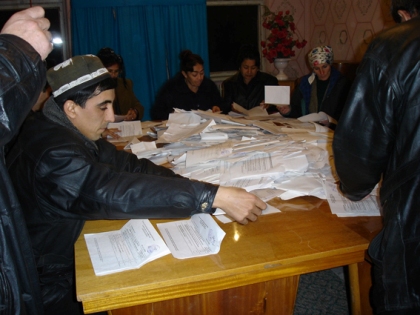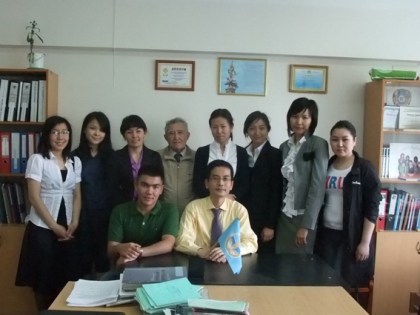Profile

- Research Subject
- Central Asian intellectuals in Tsarist and Revolutionary Russia
- Comparative research on empires
- Historical Writing and Orientalism in the (former) Soviet Union
- Politics in Central Asia (authoritarianism, conflict resolution, Islamic movements, Japan’s Central Asian diplomacy)
- Research Fields
- Central Eurasian studies
- Graduate School - Division / Department / Laboratory
- Division of Humanities / Department of Slavic-Eurasian Studies / Laboratory of Slavic-Eurasian Studies
- Contact
Email: uyama(at)slav.hokudai.ac.jp
Replace “(at)” with “@” when sending email.Foreign exchange students who want to be research students (including Japanese residents) should apply for the designated period in accordance with the “Research Student Application Guidelines”. Even if you send an email directly to the staff, there is no reply.- Related Links
Lab.letters


Central Asia, an area of cultural diversity
connecting Asia and Europe
The attraction of research on Central Asia is that the area, quite simply, has great cultural diversity. Central Asia is a region where the culture of Russia, which created the Communist Block, has been added to a historical background in which settled people and nomads have intermingled, while it is also an ethnically diverse area, where Islam and other religions intersect. In considering world trends, including the collapse of the socialist system, as well as political and economic globalization, I wonder what role Central Asia, which links Europe and Asia, has played. I have been conducting research chiefly on modern history and politics of Central Asia, and am currently also engaged in comparative studies of empires together with specialists in the history of British India, French colonies, the Japanese, Qing, and Ottoman Empires.
Understand others by eliminating stereotypes,
performing extensive and profound regional research.
The essence of area studies is to understand others. Researchers are required to open-mindedly observe and understand what has happened and is happening in the region they study, instead of thinking “inside the box.” The regions and themes targeted by the students under my supervision cover a lot of ground. There are only a few institutes in Japan where students can conduct comprehensive research on politics, economy, culture and history of Central Asia on an advanced level. Young researchers have gathered at this university from all over the country and from abroad, seeking its high level of expertise and inspiration. Central Asia is a part of the world. I encourage my students to pay in-depth attention not only to their target areas, but also to their relationships with Russia, China, the United States, Japan, and the international community.
Message
When I was a student, I wanted to see the world from a broad perspective with a focus on the regions between Europe and Asia. It was with this intention that I began my research on Central Asia and Central Eurasia. Starting with a stay in the Soviet Union during the perestroika period, I visited various parts of Central Eurasia: I followed a poet’s footsteps across the Great Steppe, and visited mountainous regions to meet locals involved in a civil war or a political upheaval. Thus, I cultivated a sense of locality, interacting with people and perusing historical documents. In my research I had to pave my own way because it was an undeveloped research field. This made the task all the more rewarding. I feel that no other region is more suitable for observing multifaceted relationships between various civilizations and nations than Central Eurasia.
Since the end of the 20th century, research on Central Eurasia in Japan has established its foundations by publishing encyclopedias and basic books as well as produced leading-edge achievements. However, there are still numerous themes to be pursued, and we expect young researchers to play a more active role in various fields. The graduate students I supervise specialize in diverse disciplines including modern history, politics, anthropology, and diplomacy, covering various countries of Central Asia and the Caucasus, as well as the Volga-Ural region. The Slavic-Eurasian Research Center provides ample opportunities for students to interact with leading foreign researchers at international symposiums and other occasions as well as with young researchers from all parts of Japan at the Hokkaido Association for Central Eurasian Studies and other gatherings. We welcome those who wish to pursue profound area studies.




